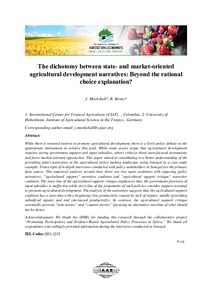The dichotomy between state- and market-oriented agricultural development narratives: Beyond the rational choice explanation?
While there is renewed interest to promote agricultural development, there is a lively policy debate on the appropriate instruments to achieve this goal. While some actors argue that agricultural development requires strong government support and input subsidies, others criticize those state-focused instruments and favor market-oriented approaches. This paper aimed at contributing to a better understanding of the prevailing policy narratives in the agricultural policy making landscape, using Senegal as a case study example. Transcripts of in-depth interviews conducted with policy stakeholders in Senegal are the primary data source. The empirical analysis reveals that, there are two main coalitions with opposing policy narratives; “agricultural support” narrative coalition and “agricultural support critique” narrative coalition. The story-line of the agricultural support critique emphasizes that, the government provision of input subsidies is ineffective while story-line of the proponents of such policies consider support essential to promote agricultural development. The analysis of the narratives suggests that, the agricultural support coalition has a story-line with a beginning (low productivity caused by lack of inputs), middle (providing subsidized inputs) and end (increased productivity). In contrast, the agricultural support critique essentially presents “non-stories” and “counter stories” (focusing on alternative storyline of what should not be done).

